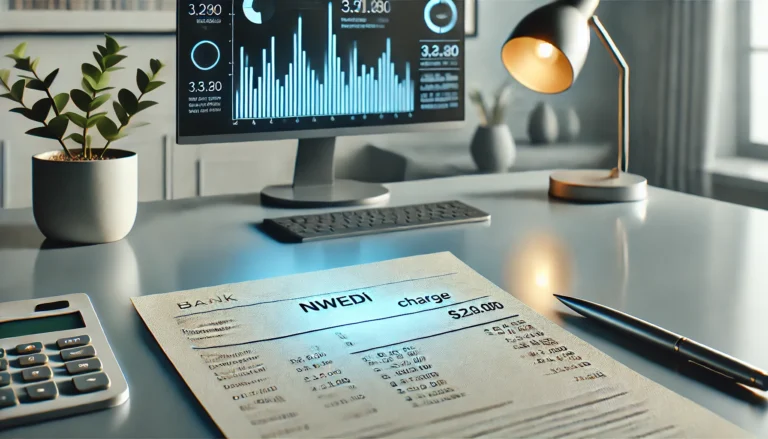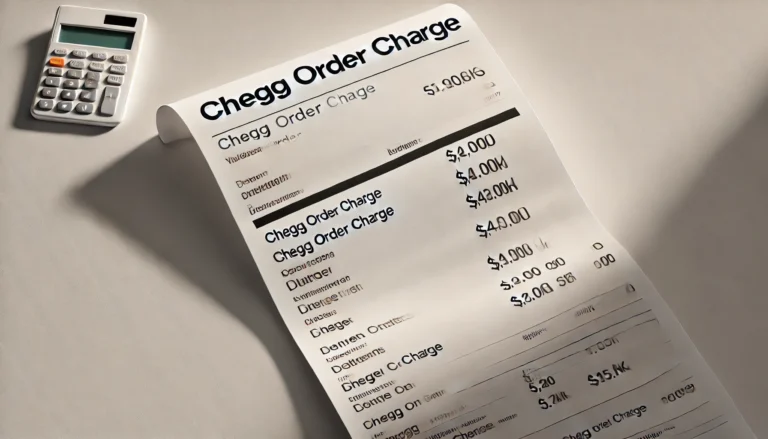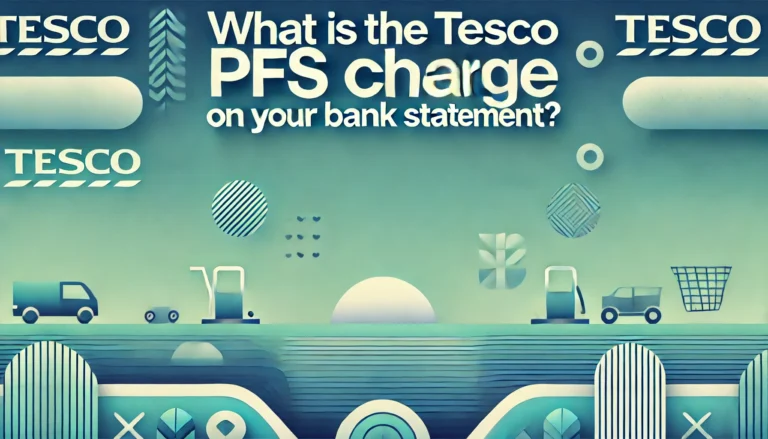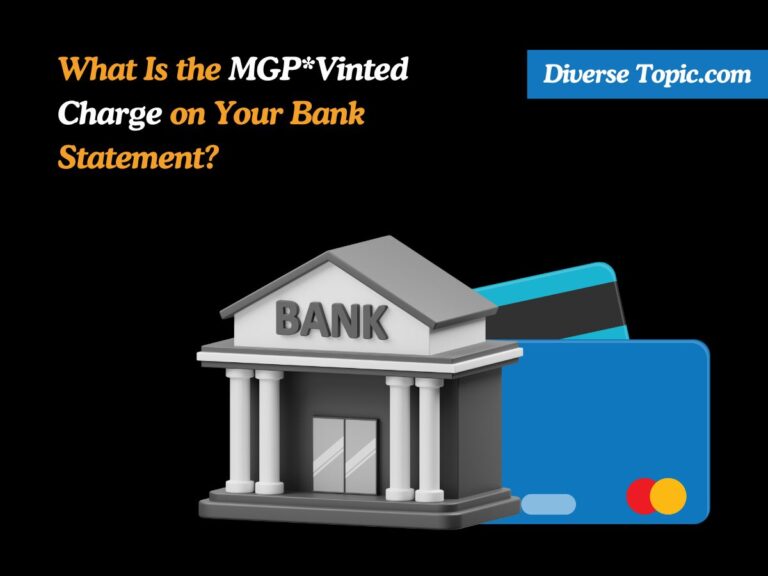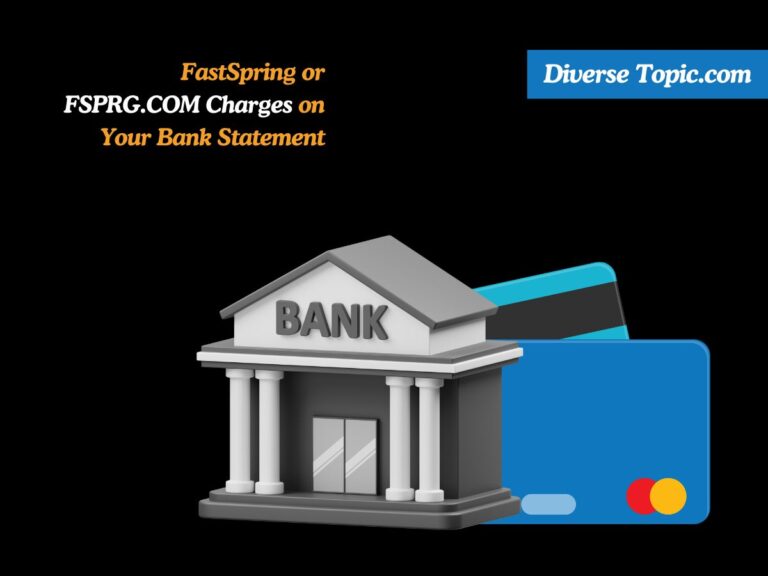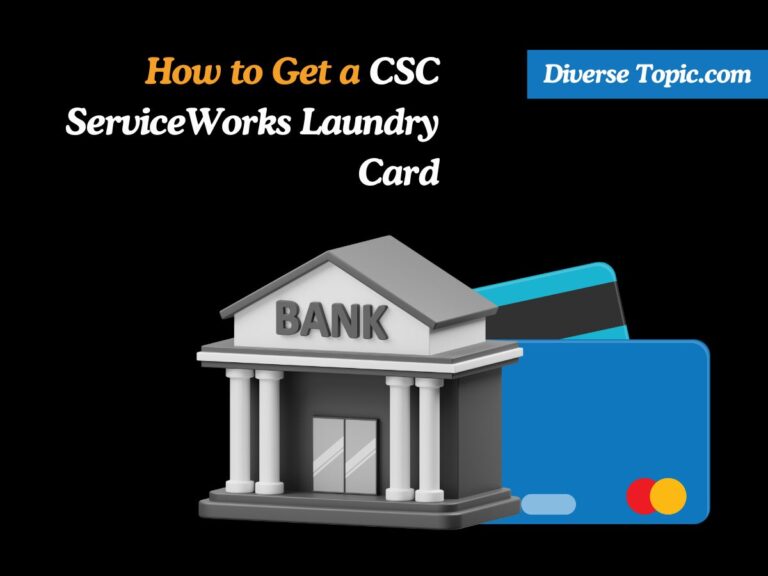What Is the Vehicle Information Charge on Your Bank Statement?
Unknown transactions might be confusing and worrisome when looking over your bank statement. “Vehicle information Charge” is one such fee that may be shown. This comprehensive guide explores the details of the charge, the reasons it appears on your account, possible frauds related to it, and practical measures to recognize, avoid, and resolve such charges.
The complexity of financial transactions has increased in the current digital era. A variety of new charges, some genuine and others perhaps fraudulent, are showing up on bank accounts as a result of the growth of online marketplaces for the purchase and sale of automobiles. It is essential to comprehend these fees in order to protect your money and private data.
What Is the Vehicle Information Bank Charge?
At its core, the vehicle information bank charge refers to a fee associated with obtaining essential details about a vehicle. These details can encompass various aspects, such as:
- Vehicle History: Records of past ownership, accidents, repairs, and maintenance.
- Identification Information: Details like the Vehicle Identification Number (VIN), make, model, and year.
- Condition Reports: Assessments of the vehicle’s current state, including any damages or mechanical issues.
This fee may be assessed by financial institutions or outside firms when you buy or request comprehensive reports regarding an automobile, particularly when you are purchasing or selling one.
Also Read What Is the Steam Purchase Charge.
Common Reasons for the Vehicle Information Charge
Understanding why this charge appears on your bank statement can demystify its purpose. Here are some common scenarios:
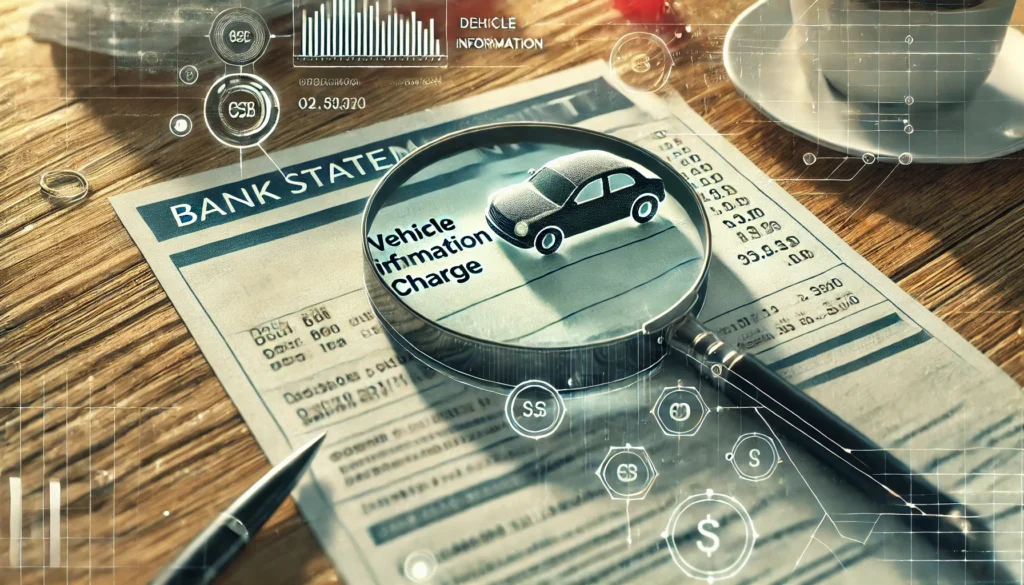
Selling a Car Online:
People who wish to sell their cars online frequently have to give prospective purchasers comprehensive details on the vehicle. This process might involve:
- Obtaining a Vehicle History Report: Services like Carfax or AutoCheck provide comprehensive reports that verify a car’s background.
- Verification Fees: Platforms may charge a fee to authenticate the vehicle’s details before listing it for sale.
Buying a Car:
Prospective buyers might incur this charge when:
- Requesting Vehicle Reports: Buyers frequently invest in comprehensive research regarding the history and condition of the automobile to make sure they’re making an informed purchase.
Routine Ownership Maintenance:
Car owners might periodically check their vehicle’s details for maintenance purposes, which can involve:
- Registration Renewals: Some regions require periodic verification of vehicle details.
- Insurance Requirements: Insurance companies might request detailed vehicle information to adjust premiums.
Legitimate Business Transactions:
Businesses involved in the automotive industry, such as dealerships or repair shops, might have recurring vehicle information charges related to:
- Inventory Management: Keeping track of vehicles in stock.
- Service Records: Maintaining detailed records for each vehicle serviced.
How Does the Vehicle Information Charge Look Like?
When reviewing your bank statement, identifying the vehicle information charge is crucial to understanding its purpose. Here’s a guide on how this charge might typically appear:
Key Elements of the Vehicle Information Charge:
Date: The date of the transaction (e.g., July 15, 2022).
Merchant/Transaction Description: The charge is often labeled as “Vehicle Information,” but variations like “Car Detail Report,” “VIN Check,” or “Vehicle History” may also be used.
Amount: The price of the charge, typically related to vehicle history reports or similar services (e.g., $19.99).
Example of How It Might Appear:
- Date: July 15, 2022
- Merchant/Transaction Description: Vehicle Information – Car Detail Report
- Amount: $19.99
While this format provides a general representation, the exact details can vary depending on your bank or financial institution.
Additional Identifying Features:
- Category: The charge may appear under categories like “Specialty Services” or “Vehicle Services.”
- Company/Website Name: It could include the name of the website or service provider associated with vehicle reports or VIN checks.
- Reference Numbers: Look for any additional notes or reference numbers to provide more context.
Scams Involving Vehicle Information Charges
While there are legitimate reasons for vehicle information charges, scammers exploit this terminology to deceive individuals, especially those looking to buy or sell cars online.
Understanding the .vin Domain Scam
One prevalent scam involves the misuse of the .vin domain. Here’s how it typically unfolds:
Appearing as Potential Buyers: Scammers pose as interested buyers on online car selling platforms.
Requesting Vehicle Information: They indicate that they would want to buy the automobile, but they must first receive a report on the vehicle’s history.
Redirecting to Fraudulent Websites: In order to get the report, sellers are referred to websites that finish in “.vin”. Even though “VIN” stands for “Vehicle Identification Number,” there are other uses for the.vin domain outside legal services.
Requiring Personal Information and Payment: In order for the report to be generated, sellers need to provide personal information and pay, frequently using a credit card.
Disappearing After Payment: Once the report is sent, scammers cut off all communication, leaving sellers without a buyer or their money.
This scheme preys on the urgency and trust of sellers, making it essential to recognize and avoid such fraudulent practices.
How to Identify and Address the Vehicle Information Charge?
If you spot a “vehicle information” charge on your bank statement and suspect it may be unauthorized, follow these steps to identify its source and take action:
Review Your Transaction History:
First, take a look at what you’ve been up to and see whether you’ve lately gotten a car history report from a reliable source. Verify if the price is what you would anticipate paying for this kind of service.
Look for Communication from the Service Provider:
The service provider ought to have sent you a receipt or confirmation email if the charge was authorized. Look through your bank records and email inbox for any correspondence pertaining to car history reports.
Investigate the Website:
Look into the website more thoroughly if the charge was made through a website with a “.vin” extension or any other unknown domain. Check the website’s reputation, look for internet reviews, and confirm that it is a reputable source of car reports.
Contact Your Bank or Credit Card Provider:
Get in touch with your bank or credit card company right once to dispute the transaction if you think it is fraudulent. A refund may be given if it is shown that the charge was fraudulent, and many institutions provide precautions against illegal transactions.
Report the Fraud:
Report the fraudulent website and behavior to the Federal Trade Commission (FTC) or a comparable consumer protection organization in your area if you have been the victim of scamming. By reporting the scam, you may assist law enforcement in taking down the fake website and avert future victims.
Read About What Is the LH Trading Charge.
Preventing the Vehicle Information Charge in the Future
Here are a few tips to help you prevent unauthorized vehicle information charges from appearing on your bank statement in the future:
Use Trusted Services for Vehicle Reports:
Only use well-known and trusted websites to obtain vehicle history reports. Reputable services like Carfax, AutoCheck, or those provided by government authorities are your best option for avoiding scams.
Be Wary of Unsolicited Requests for Reports:
Be wary if an internet contact asks for a car report and points you toward a certain website—especially one you’ve never heard of. This tactic is frequently used by scammers to direct sellers to phony websites. Offer to use a reliable service in its place, and refrain from clicking on unwanted links.
Double-Check Website URLs:
Verify the URL twice before providing any personal or financial information on a website. Verify that the website is safe (search for “https://”) and that the company behind it is reputable.
Set Up Transaction Alerts:
You may set up email or SMS notifications for transactions with many banks. These notifications help you identify illegal charges quickly by informing you whenever a charge is made to your account.
Monitor Your Bank Statements Regularly:
Check your credit card and bank statements often for any strange expenditures. You can handle a fraudulent charge more quickly if you identify it early on.
Conclusion:
It might be alarming to find a charge labeled “vehicle information” on your bank account, particularly if it is not recognizable to you. You may trade with more confidence and security if you know what this fee entails, can identify the situations that lead to it, and are aware of possible frauds.
To safeguard your financial stability, always be on the lookout, use secure internet behaviors, and take immediate action against any illegal expenditures.

